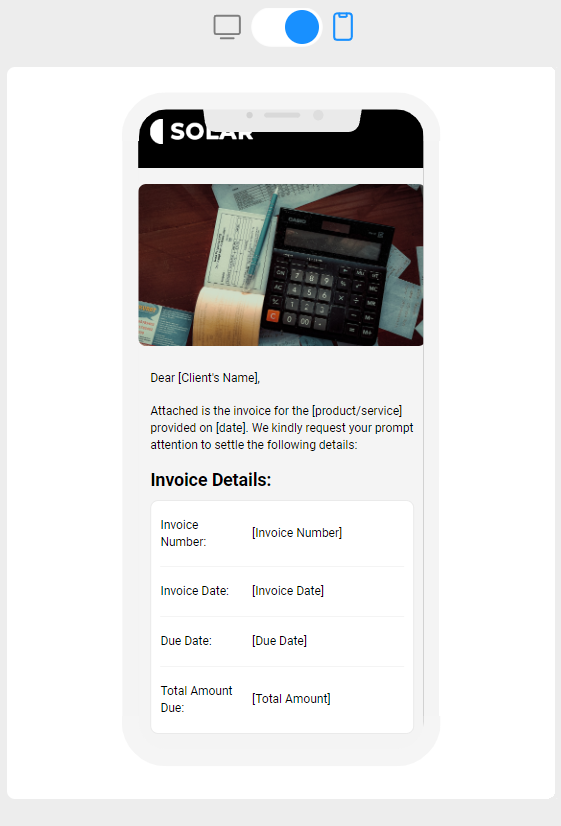Streamline Billing with Professional Invoice Email Templates
In today’s fast-paced business environment, optimizing efficiency in every aspect of your operations is crucial. One area where businesses often face challenges is the invoicing process. Fortunately, utilizing an effective invoice email template can simplify your billing procedures and enhance communication with your clients.
In this article, we will explore the benefits of invoice email templates, discuss the businesses that can benefit from using them, provide advice on writing a compelling copy, offer tips for designing a visually appealing template, and highlight common mistakes to avoid.
Benefits of Invoice Email Templates
An invoice email template offers several benefits for businesses of all sizes and industries. Let’s explore the key advantages:
Streamlined Invoicing Process
An invoice email template provides a standardized format for presenting invoices, including crucial details such as billing items, quantities, prices, and total amounts. By using a consistent layout, you ensure clarity and reduce the chances of errors or misunderstandings.
Improved Communication and Professionalism
By utilizing an invoice email template, you can maintain a professional image while effectively communicating payment-related information to your clients. Predefined sections for payment terms, due dates, and accepted payment methods ensure that important details are conveyed clearly and concisely.
Time and Cost Savings
An invoice email template saves significant time and resources. Instead of creating invoices from scratch for each client, you can generate invoices quickly and efficiently using the preformatted structure. Additionally, automated reminders and follow-ups can be easily set up within the template, reducing manual effort in payment tracking.
Businesses That Can Benefit from Invoice Email Templates
Invoice email templates are versatile tools that can benefit various types of businesses, including:
- Freelancers and independent contractors. Freelancers and independent contractors can use invoice email templates to present professional-looking invoices to their clients, ensuring prompt payment for their services.
- Small and medium-sized enterprises (SMEs). SMEs often have limited resources and manpower. By utilizing invoice email templates, they can streamline their invoicing process, maintain consistency in billing communications, and allocate more time and resources to core business activities.
- Service-based businesses. Businesses providing services, such as consulting firms, marketing agencies, or IT service providers, can benefit from invoice email templates to present clear, itemized invoices to their clients. This enhances transparency and minimizes billing disputes.
- E-commerce and online retailers. For online businesses, invoicing is a critical part of their operations. Invoice email templates allow e-commerce and online retailers to automate the invoicing process, ensuring timely payment collection and improving customer satisfaction.
Writing an Engaging Copy for Your Invoice Email Template
Crafting an engaging copy for your invoice email template is crucial to encourage prompt payment and maintain a positive client relationship. Here are some tips to consider:
Personalization and Customization
Tailor the copy to reflect your brand’s voice and tone. Address the client by name, express appreciation for their business, and include personalized notes when necessary. This personal touch fosters a stronger connection with your clients.
Clear and Concise Language
Use clear, jargon-free language to communicate payment details effectively. Avoid excessive technical terms or complex explanations. Make the invoice easy to understand at a glance to minimize confusion and delays.
Highlighting Payment Terms and Due Dates
Emphasize payment terms, due dates, and any applicable late payment penalties. Clearly state the accepted payment methods and provide detailed instructions for each method to ensure smooth transactions.
Expressing Gratitude and Building Customer Relationships
Include a brief thank-you note in your invoice email template to express gratitude for your clients’ business. Building positive customer relationships can encourage prompt payment and foster long-term partnerships.
Designing an Effective Invoice Email Template
A well-designed invoice email template enhances professionalism and promotes a positive payment experience. Consider the following design tips:
Brand Consistency
Ensure your invoice email template aligns with your brand’s visual identity. Use consistent colors, fonts, and logo placement to reinforce brand recognition and create a cohesive experience.
Clear Structure and Formatting
Organize the invoice in a logical and easy-to-read manner. Use headings, subheadings, and bullet points to structure the information clearly. Ensure important details such as invoice number, date, and total amount are prominently displayed.
Use of Visual Elements
Incorporate your brand’s visual elements, such as logos or relevant images, to create a visually appealing invoice. However, be mindful of keeping the design clean and uncluttered to maintain a professional appearance.
Mobile Responsiveness
Ensure your invoice email template is mobile-friendly, as many recipients may view it on smartphones or tablets. Test the template’s responsiveness across different devices and email clients to ensure optimal display and readability.
Common Mistakes to Avoid
To maximize the effectiveness of your invoice email template, steer clear of these common mistakes:
Incomplete or Inaccurate Information
Double-check that all necessary details are included, such as billing items, quantities, prices, and total amounts. Inaccurate or missing information can lead to confusion and delayed payments.
Unclear Payment Terms and Instructions
Ensure your payment terms and instructions are clearly stated. Ambiguity or vague instructions can result in payment delays or errors.
Lack of Personalization
Avoid sending generic invoice emails that lack a personal touch. Address clients by name and include personalized notes when appropriate. This demonstrates that you value their individual business.
Neglecting Follow-up Communication
Don’t forget to set up automated reminders or follow-up emails for overdue payments. Consistent communication helps maintain payment momentum and reduces the chances of payment delays.
Conclusion
Incorporating an invoice email template into your business’s invoicing process can revolutionize the way you communicate with clients and streamline your operations. By tailoring the copy to your brand’s voice, including essential payment details, and designing a visually appealing template, you can enhance professionalism and improve payment turnaround. Avoiding common mistakes and following best practices will ensure an efficient and effective invoicing process for your business. Take advantage of the benefits offered by invoice email templates and optimize your invoicing process for greater efficiency and customer satisfaction.
Boost your Invoice templates with Blocks!
Sign up now to craft your effective Invoice email templates!
